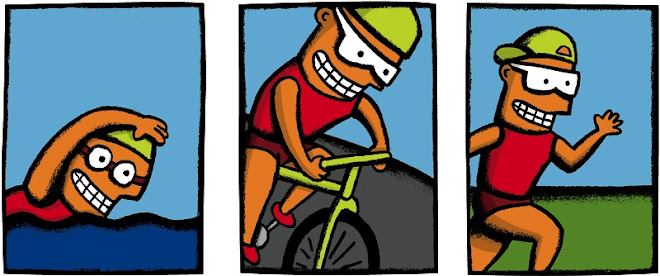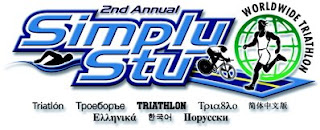Here is the theory to which the Bigun aspires to. First, though, you should know that my beliefs are a bit skewed - it's a poor man's

belief. If I had the money, sure I'd train with a power meter, but I think I'd always rely more heavily on the Heart Rate Monitor. Second, I didn't come up with any of this - it's all stuff I've read, or an interpretation at least.
Each heart beat is like the striking of a match stick. And like a box of matches, you start the race with only so many, plus whatever you can add along the way in the form of food and liquid calories. You train your heart to burn more efficiently each time you exercise, and without complicating that too much, the heart will draw it's fuel - the wood of the matchstick - either from fat or from glycogen stores. There's lots more at work than that, but in the simple world of the Bigun, that's how it works for me.
When you train, you either train your heart to be more efficient at burning from fat stores or from glycogen stores (
again, HIGHLY simplified - you always are burning a combination to some degree). Fat burns much more efficiently, but is utilized mostly at lower heart rates. At some point when the HR rises, the heart switches from burning (mostly) fat to burning (mostly) glycogen. It's been written that glycogen stores deplete in about 2 hrs. I don't think you could burn up all of your fat stores - well, at least the Bigun can't - in even a 17 hr Ironman race (
oh yea, it gets deeper still, with intra-muscular fat being even more efficient...remember, Bigun like candy...).
Similarly, you stay in an aerobic (in the presence of oxygen) state at lower heart rates, while burning fat, and you go anaerobic - where you cannot process your lactate faster than you produce it, building it up and causing PAIN, at higher heart rates, also burning up your glycogen stores.
So the trick (for endurance events, at least) is to keep your heart burning (mostly) fat as long as possible. That requires keeping the HR low - for me, I've got to stay in the 140's or even under 140 to really be in the proper HR range. I think the goal is 70% - 80% of max HR - for a fit 42 year old, having never been tested, my max HR is probably around 182bmp. So my base range, or my aerobic heart rate range would be 127 - 145. My running pace at 140bpm is just under 11 min miles, and I can bike around 19mph. I'm sorry, but that's just not fast enough for the Bigun.
There is the theory that if you want to run fast, you gotta run FAST. There is also the theory that if you want to run fast, you have build a big base and run SLOW. I particularly like the added bonus from not running fast - I don't get injured as easily. So...I prescribe to the run slow, race fast theory - and mix in some speed work too.
I also believe that given the right conditions, one matchstick will burn brighter and longer than another. Give that match more oxygen, control how it burns, and capture the heat and light that it produces BETTER, and you'll get more out of each match. The same goes for the heart beat. The only way the heart will be more efficient at burning fat is to train, a lot, in an aerobic state. The more efficient the body becomes at processing energy in an aerobic state, the faster you will get at lower heart beat rates.
This would explain the 12 Base Training weeks I have scheduled in the beginning of '08 in preparation for IMCdA'08. But I also like to go fast. I enjoy a good sprint tri; going all out for an hour and a half or so. This requires specificity in training too - training the body to be good at processing glycogen stores and processing lactic acid. This is done in my "Build" and "Tempo" weeks - lots of intervals and Fartleks planned in those weeks.
Oh yea, so the big point, though, is the relationship between HR training and Power training - if I had access to only one, I'd surely take HR - ok, look at it this way....what all effects heart rate? Heat, humidity, sleep, rest, sickness or overall health, plus a bunch of others I'm sure I'm leaving out. If, then, my plan on race day is to pedal at an average of 170 watts, but it happens to be uber-hot or I've got a bug I don't know about - my plan is all messed up. 170 watts might be way too hard for the condition I'm in at that moment. 170 watts might take 160bpm today, because I'm having a bad day. If I used HR as my limiter, instead, if I"m sick or it's hot, I can still have the HR goal at say, 150bpm, I just won't be running or pedaling as hard. The difference is that in 3 hrs, I won't blow up if I keep my HR goals.
I'm not sure if I explained it well or not - I get questions from time to time on why I trained a certain way - like a mixed workout, where I'll throw some speed work into a longer aerobic

session. A workout like that trains the body to move in and out of one fuel source to another, like what would be necessary in a race with some hills or wind in one direction. Mixing up workouts really takes the boredom out of triathlon training and gives you a "release" of discipline when in pure base mode.
Shoot, I was a "2.0 and go" kinda student in College - so I could have all this bassackwards. But, it seems to be working for me, so I'll stick with it, until they write something new and revolutionary and different in Triathlete or Inside Tri.

 there to the left...
there to the left... there to the left...
there to the left...
 "That's when you go riding into town, a woop'en and a womp'in every living thing to within an inch of it's life...sparing the women of course." - Blazing Saddles
"That's when you go riding into town, a woop'en and a womp'in every living thing to within an inch of it's life...sparing the women of course." - Blazing Saddles


































































